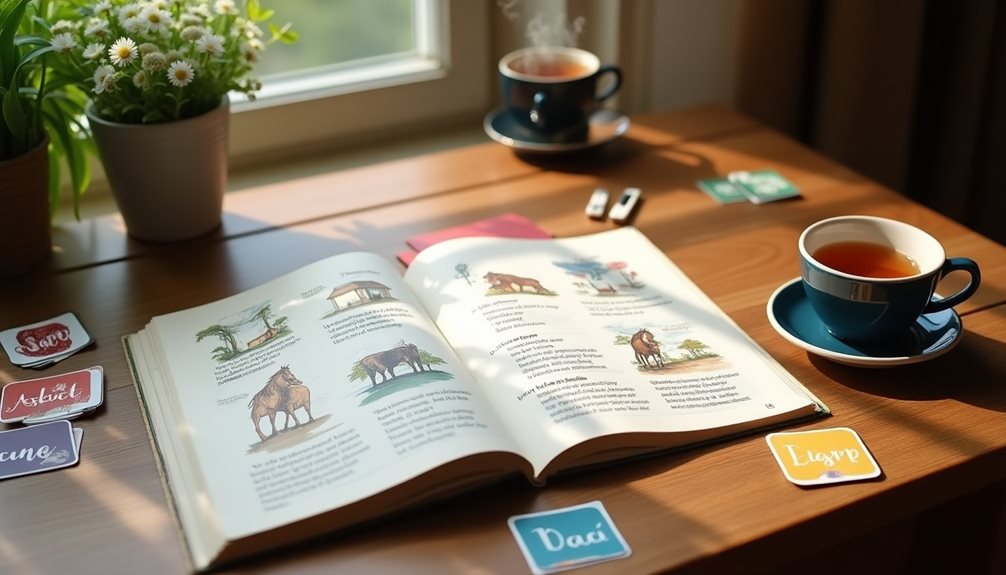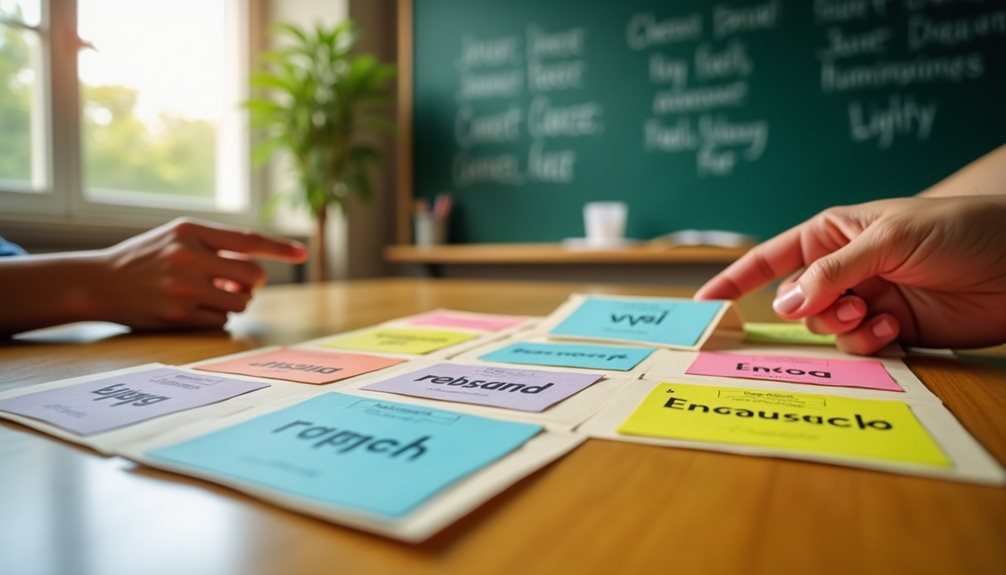Mastering Russian case concord for adjectives and pronouns requires a thorough understanding of the six primary cases. Each case serves a distinct function in sentences, influencing how adjectives and pronouns align with nouns. This alignment hinges on gender, number, and case, necessitating careful attention. By recognizing common pitfalls and engaging in targeted exercises, learners can enhance their grammatical precision. Yet, what strategies effectively bridge the gap between theory and practical application?
Table of Contents
ToggleUnderstanding the Basics of Russian Cases

Russian is a language that invites you to see how words fit together in new ways. At the heart of its structure are six cases, each one shaping the role words play in a sentence. Nouns, pronouns, and adjectives change their endings depending on whether they’re acting as the subject, showing possession, receiving an action, or describing where something happens. This pattern, known as noun declension, can seem unfamiliar at first, but it offers a logical framework that brings clarity to your ideas. As you discover how the nominative points out the main player or how the accusative directs attention to the object, you start to unlock the unique rhythm of Russian sentences. Grasping these basics not only helps you build your own phrases with confidence but also deepens your appreciation for the logic and beauty woven into the language’s design.
The Role of Adjectives in Russian Grammar
Adjectives in Russian are essential for describing nouns, making speech and writing more vivid and precise. They answer questions like “какой?” (what kind?), “чей?” (whose?), and “который?” (which?). Russian adjectives not only add detail but also play a grammatical role by matching the noun they modify in gender (masculine, feminine, neuter), number (singular, plural), and case (nominative, accusative, genitive, dative, instrumental, prepositional).
There are several types of adjectives in Russian, each serving a different function:
- Qualitative adjectives (качественные прилагательные) describe qualities that can vary in degree. For example, большой (big), красивый (beautiful), тёплый (warm). These adjectives can form comparative and superlative forms, such as больше (bigger), самый красивый (the most beautiful).
- Relative adjectives (относительные прилагательные) indicate a relationship or origin, often derived from nouns. Examples include исторический (historical), железный (iron/metal), летний (summer, as in “summer dress” — летнее платье). Unlike qualitative adjectives, they don’t have degrees of comparison.
- Demonstrative adjectives (указательные прилагательные) point out specific nouns. Words like этот (this), тот (that), такой (such) serve this purpose. For instance: эта книга (this book), тот дом (that house).
- Possessive adjectives (притяжательные прилагательные) show ownership or association. Common examples: мой (my), твой (your), наш (our), ваш (your, formal/plural). They answer the question “чей?” For example: моя мама (my mother), их машина (their car).
- Interrogative adjectives (вопросительные прилагательные) are used to ask about the qualities or identity of a noun. The main word is какой (which/what kind of). Example: Какой фильм ты смотришь? (Which movie are you watching?)
Adjectives always agree with the noun they modify. For example:
- Masculine singular: большой дом (big house)
- Feminine singular: большая комната (big room)
- Neuter singular: большое окно (big window)
- Plural: большие города (big cities)
Russian adjectives change their endings according to six grammatical cases. For instance, in the genitive case:
- Masculine: большого дома
- Feminine: большой комнаты
- Neuter: большого окна
- Plural: больших городов
Understanding adjective-noun agreement is fundamental for fluency. Misusing adjective endings can lead to confusion or awkwardness in speech. Mastery of Russian adjectives opens up greater expressive possibilities, allowing you to specify not just “a book,” but “this old Russian book” (эта старая русская книга) — each word adding nuance and depth.
Some useful Russian words and phrases related to adjectives:
- прилагательное — adjective
- согласование — agreement
- окончание — ending
- род — gender
- число — number
- падеж — case
Learning how adjectives function and change in Russian greatly improves both comprehension and communication, giving you the tools to express yourself accurately and colorfully.
![]()
Pronouns and Their Case Usage
Pronouns are essential elements in Russian grammar, functioning as substitutes for nouns and helping to avoid repetition in speech and writing. Unlike adjectives, which modify nouns by adding descriptive detail, pronouns stand in for nouns altogether. Russian pronouns fall into several categories: личные (personal), притяжательные (possessive), возвратные (reflexive), and указательные (demonstrative), among others. Each category has its distinct role and changes form based on the grammatical case in use.
Case Usage in Russian Pronouns
Cases play a central role in Russian grammar, and pronouns are no exception. The form of a pronoun depends on its function in the sentence—whether it is the subject, object, or shows possession, among other roles. For example:
- Personal Pronouns (Личные местоимения):
These include words like “я” (I), “ты” (you), “он” (he), “она” (she), “мы” (we), and “они” (they). Each pronoun takes different forms depending on its case:- Nominative: я, ты, он
- Accusative: меня, тебя, его
- Genitive: меня, тебя, его
- Possessive Pronouns (Притяжательные местоимения):
Used to indicate ownership, such as “мой” (my), “твой” (your), “наш” (our), “их” (their). These pronouns agree in gender, number, and case with the noun they modify. For example:- мой дом (my house)
- моя книга (my book)
- мои друзья (my friends)
- Reflexive Pronoun (Возвратное местоимение):
Russian uses “себя” to show that the subject and object of a verb are the same person. This pronoun also changes with cases but does not have a nominative form.- Я вижу себя в зеркале. (I see myself in the mirror.)
- Demonstrative Pronouns (Указательные местоимения):
These help specify what or whom we are talking about: “этот” (this), “тот” (that), “та” (that, feminine), “те” (those). Like adjectives, they change for gender, number, and case.- этот стол (this table)
- ту книгу (that book, accusative case)
Interesting Facts About Russian Pronouns
- Russian often omits personal pronouns in speech because the verb ending makes it clear who is performing the action.
- The reflexive pronoun “себя” is unique as it never appears in the nominative; it’s always referring back to the subject.
- Some possessive pronouns like “его” (his) and “её” (her) look identical to certain forms of personal pronouns but differ in stress and usage.
Useful Russian Phrases and Words:
- Кто это? (“Who is this?”)
- Это мой друг. (“This is my friend.”)
- Она читает свою книгу. (“She is reading her book.”)
- У меня нет её телефона. (“I don’t have her phone.”)
Mastering the use of pronouns and their case forms is vital for expressing yourself accurately in Russian. It not only helps you sound more fluent but also prevents misunderstandings by clearly indicating who or what is being discussed. Recognizing these distinctions will deepen your understanding of Russian sentence structure and communication style.
Agreement Rules for Adjectives and Pronouns
Understanding how adjectives and pronouns agree with nouns is fundamental for mastering Russian grammar. In Russian, both adjectives (прилагательные) and pronouns (местоимения) must reflect the characteristics of the nouns they describe or replace. This means they change their endings according to the gender (род), number (число), and case (падеж) of the noun. This system is more complex than in English, and it is key to expressing ideas clearly and accurately.
Adjective-Noun Agreement
Adjectives in Russian always adapt to the noun they modify. For example, the word “beautiful” changes depending on whether the noun is masculine, feminine, or neuter, as well as singular or plural:
- красивый дом (krasivyy dom) — beautiful house (masculine, singular)
- красивая девушка (krasivaya devushka) — beautiful girl (feminine, singular)
- красивое озеро (krasivoe ozero) — beautiful lake (neuter, singular)
- красивые цветы (krasivye tsvety) — beautiful flowers (plural)
The endings -ый/-ий, -ая, -ое, and -ые indicate these gender and number differences. When the case changes, so do the endings. For example, in the accusative case:
- Я вижу красивую девушку. (I see a beautiful girl.)
Pronoun-Noun Agreement
Pronouns also follow this pattern. Personal pronouns like “he” (он), “she” (она), and “it” (оно) are always matched to the gender of the noun. Possessive pronouns change their endings as well:
- мой стол (moy stol) — my table (masculine)
- моя книга (moya kniga) — my book (feminine)
- моё окно (moyo okno) — my window (neuter)
- мои друзья (moi druz’ya) — my friends (plural)
This agreement extends beyond personal pronouns to demonstrative pronouns like “this” (этот, эта, это, эти) and interrogative pronouns like “which” (какой, какая, какое, какие).
Key Russian Words & Phrases
- Прилагательное (prilagatel’noe) — Adjective
- Местоимение (mestoimenie) — Pronoun
- Род (rod) — Gender
- Число (chislo) — Number
- Падеж (padezh) — Case
- Согласование (soglasovanie) — Agreement
Why Agreement Matters
Getting agreement right is essential for communication:
- It avoids misunderstandings. Incorrect agreement can confuse listeners or readers about who or what is being discussed.
- It adds precision and elegance to speech and writing.
- It reflects the logic and structure of the Russian language, helping speakers develop an intuitive grasp of how words interact.
Mastery of these rules enriches not only everyday conversation but also reading and writing skills. It allows speakers to express themselves fully and accurately, showing respect for the language’s structure and beauty.
Common Mistakes to Avoid
Navigating Russian case concord can be challenging for both beginners and advanced learners. Mistakes in this area can quickly lead to misunderstandings or awkward phrasing. Understanding the most common pitfalls—and how to avoid them—significantly improves both written and spoken Russian.
A major challenge is confusion over case endings, especially when matching adjectives and nouns. In Russian, adjectives must agree with nouns not just in gender (род), but also in number (число) and case (падеж). For example, the word “большой дом” (big house, nominative masculine singular) changes to “большого дома” (of the big house, genitive masculine singular), with both the adjective and noun shifting according to case rules. Learners often mistakenly use the wrong adjective ending if they forget to check the noun’s form.
Another common error is defaulting to the nominative case (именительный падеж), especially when the accusative (винительный падеж) or genitive (родительный падеж) is required. For instance, after verbs like “видеть” (to see) or “любить” (to love), the object should be in the accusative: “Я вижу машину” (I see a car), not “Я вижу машина.” The nominative is often incorrectly used out of habit, which results in sentences that sound unnatural or are simply incorrect.
Context is also crucial for proper case selection, as prepositions and certain verbs demand specific cases. Prepositions such as “в” (in, into) and “на” (on, onto) require different cases depending on the intended meaning. For example:
- “Я иду в магазин” (I am going to the store) — accusative case, indicating motion.
- “Я в магазине” (I am in the store) — prepositional case, indicating location.
Failure to recognize such distinctions is a frequent stumbling block. Similarly, possession in Russian is indicated by the genitive case: “книга Анны” (Anna’s book), not by using an apostrophe as in English.
Key vocabulary and phrases related to Russian cases:
- Падеж (case)
- Род (gender)
- Число (number)
- Согласование прилагательных и существительных (agreement of adjectives and nouns)
- Именительный падеж (nominative case)
- Родительный падеж (genitive case)
- Винительный падеж (accusative case)
- Предложный падеж (prepositional case)
- Творительный падеж (instrumental case)
- Дательный падеж (dative case)
To build accuracy, it’s helpful to:
- Practice matching adjectives and nouns by gender, number, and case.
- Learn common verbs and prepositions alongside the cases they require.
- Expose yourself to authentic Russian texts to see correct forms in context.
By focusing on these aspects and being mindful of these typical mistakes, learners develop stronger, more confident Russian language skills and avoid errors that can obscure meaning.
Practical Exercises for Mastery

Building a strong foundation in Russian case concord is essential for nuanced expression. Mastery comes from not only understanding the rules but also applying them creatively and analytically. For learners who thrive on intellectual challenge and artistic exploration, these exercises offer both structure and inspiration:
1. Sentence Creation with Varied Adjectives and Cases
Challenge yourself to craft original sentences featuring a range of adjectives and noun combinations across all six Russian cases. For example, start with a simple noun like “книга” (book) and systematically modify it and its adjective through each case:
- Именительный: интересная книга
- Родительный: интересной книги
- Дательный: интересной книге
- Винительный: интересную книгу
- Творительный: интересной книгой
- Предложный: об интересной книге
Experiment with abstract and poetic adjectives to stretch your vocabulary and sense of style.
2. Paragraph Rewriting for Case Transformation
Take a short paragraph and rewrite it several times, each time changing the grammatical function of key nouns. Adjust all adjectives, pronouns, and verbs accordingly. For example, transform the subject into an object, or switch from singular to plural. This exercise sharpens your awareness of how grammatical shifts affect meaning and nuance.
3. Dialogue Construction for Case Concord
Write dialogues where characters use adjectives and nouns in various cases. Focus on realistic conversational topics—art, travel, philosophy—to embed case concord in authentic contexts. Swap roles with a study partner: one writes the first line, the other responds, ensuring all adjective-noun pairs remain in agreement.
4. Text Analysis: Case Transformations in Context
Select excerpts from literature, news articles, or essays. Identify every instance where a noun and its modifiers change case due to syntactic demands (e.g., after prepositions or verbs). Annotate these passages, noting how each transformation affects emphasis or interpretation. Discuss your findings in a study group or journal.
5. Creative Writing with Case Constraints
Compose a short story or poem in which each sentence must feature at least one adjective-noun pair in a specific case. Rotate through the cases as the narrative unfolds. This exercise not only reinforces grammatical accuracy but also encourages inventive language use.
These activities do more than drill patterns—they invite you to see case concord as both an intellectual puzzle and a creative tool. Each task deepens your sensitivity to the subtleties of Russian grammar and empowers you to wield language with precision and artistry.
Unlocking Russian Expression: Make Case Concord Your Superpower
Mastering Russian case concord for adjectives and pronouns isn’t just about memorizing tables or drilling endings—it’s about unlocking a whole new level of self-expression. When you can confidently match endings across cases, genders, and numbers, you move beyond basic communication to speaking and writing with nuance, clarity, and style.
Think of each correctly matched adjective-noun pair as a building block in constructing vivid images and precise ideas. The more you practice agreement, the more natural and intuitive Russian sentences will feel. Don’t be discouraged by early mistakes—they’re stepping stones toward fluency.
Every exercise, dialogue, and creative challenge brings you closer to thinking in Russian, not just translating. The logic of the language will reveal itself over time, and what once seemed complex will become second nature. Embrace the challenge, celebrate your progress, and let your newfound mastery of case concord open doors to richer conversations and deeper cultural understanding.
Keep experimenting, keep exploring, and soon, Russian won’t just be a language you study—it’ll be a language you truly own.
Frequently Asked Questions
How Do Cases Affect Sentence Structure in Russian?
Cases in Russian greatly influence sentence structure, as they determine noun, adjective, and pronoun forms based on their grammatical functions. For instance, “красивый” (beautiful) changes depending on its role, affecting clarity and meaning in sentence examples.
Are There Exceptions to Adjective Agreement Rules?
Exceptions to adjective agreement rules exist, often leading to common mistakes. These exceptions are explained through specific contexts, such as colloquial usage or compound adjectives, highlighting the importance of understanding flexibility within grammatical structures.
How Can I Practice Cases in Everyday Conversation?
To enhance case understanding, individuals should engage in daily practice through case exercises. This approach fosters intuitive usage, allowing for natural integration of grammatical structures into everyday conversations, ultimately leading to improved language proficiency and confidence.
What Resources Are Best for Learning Russian Cases?
To effectively learn Russian cases, one should consider extensive grammar textbooks, interactive apps, and engaging in language exchanges. Each resource offers distinct advantages, facilitating a deeper understanding of case usage in practical contexts.
How Do Regional Dialects Affect Case Usage in Russian?
Regional variations and dialectal differences greatly influence case usage in Russian. Certain regions may favor specific forms or constructions, leading to variations that reflect local linguistic identities, thereby enriching the overall complexity of the language.



